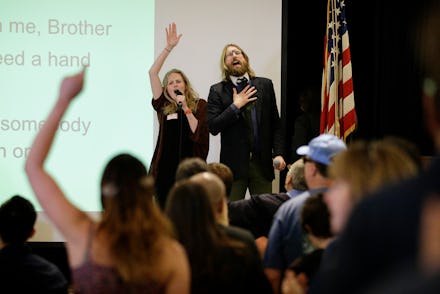Why 'Atheist Churches' Are Making Us Atheists Look Ridiculous

"Organizing atheists," said Richard Dawkins, "is like herding cats." That fact became quite clear recently, as one of the largest organized assemblies of nonbelievers suffered an internal rift. Some members of the Sunday Assembly — an "atheist church" founded by British comedians Sanderson Jones and Pippa Evans — declared that they would form a splinter group called Godless Revival, drawing comparisons to the hundreds of divisions within the world's major religions.
The Sunday Assembly split doesn't quite have the excitement of, say, the centuries of bloodletting between Sunnis and Shias, or Catholics and Protestants. But it raises an important question: do non-believing assemblies differ from theistic congregations in any meaningful way? Come on, atheists. You left the church for a reason, didn't you?
We shouldn't be surprised at the split in the Sunday Assembly. The lack of dogma means there's no one "right" way to not believe in the supernatural, so there's no way to prove either brand of humanism "wrong." But why are these atheists still gathering on Sundays?
There are a few likely answers to this question. Perhaps former churchgoers are simply too conditioned to seek guidance on Sundays. It's also entirely possible that many of the congregants simply see church-like communities as a good way to empower atheism. This is quite a stretch.
Another possibility, though, is that those who have been told all their lives that they're incapable of being good without a god have internalized that message. Consciously or not, those who have joined the Sunday Assembly likely still yearn to look outward for moral guidance. Any atheist will defend his or her potential to be a good without a god, but truly personalizing your morality and living like it can be more difficult.
In other words, it's one thing to conceptually reject a top-down, dogmatic morality and the herd mentality that goes with it, but it's another thing altogether to remember that every human being can lead a fulfilled, moral life without a weekly appointment.
The disagreements that led to the Sunday Assembly "schism" are humanistic. How should we gather to enrich our lives? Which secular aspects of human culture should we celebrate? Is bikini night at the bar the best setting for our group? These questions are a result of the skeptic's original truth — you don't need to do X or Y every this day or that day to live a fulfilled life. Thus, the possibilities are endless.
The nonbelievers of the SA know this, on some level. But by modeling the Assembly gatherings after those of church, the SA runs the risk of implying that you still need someone else to tell you how to live. There's nothing wrong with joining other heathens on Sunday to discuss particle physics or secular morality, but trading one external moral authority for another misses the point entirely.